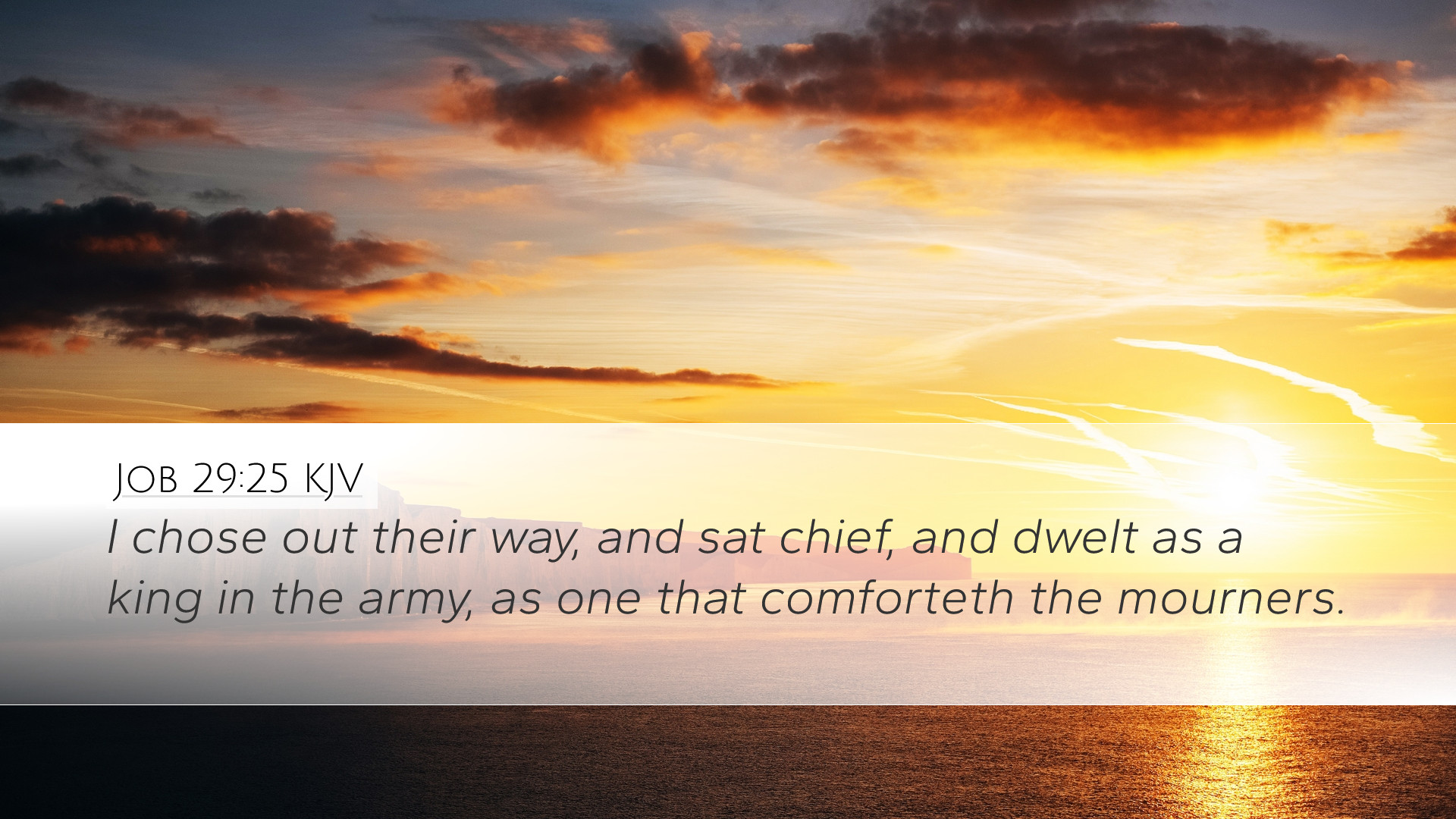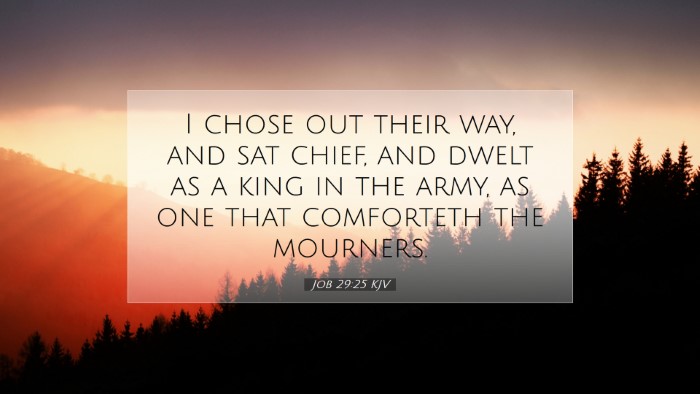Old Testament
Genesis Exodus Leviticus Numbers Deuteronomy Joshua Judges Ruth 1 Samuel 2 Samuel 1 Kings 2 Kings 1 Chronicles 2 Chronicles Ezra Nehemiah Esther Job Psalms Proverbs Ecclesiastes Song of Solomon Isaiah Jeremiah Lamentations Ezekiel Daniel Hosea Joel Amos Obadiah Jonah Micah Nahum Habakkuk Zephaniah Haggai Zechariah MalachiJob 29:25
Job 29:25 KJV
I chose out their way, and sat chief, and dwelt as a king in the army, as one that comforteth the mourners.
Job 29:25 Bible Commentary
Commentary on Job 29:25
Job 29:25 states: "I chose out their way, and sat chief, and dwelled as a king in the army, as one that comforteth the mourners." This verse encapsulates a moment of Job’s reflection on his former status and the compassion with which he treated others during his days of prosperity. The reflections provided here draw from esteemed public domain commentaries, enriching our understanding and application of this scripture.
Contextual Overview
The Book of Job explores profound themes of suffering, fidelity, and divine sovereignty. Job’s discourse in chapter 29 serves as a poignant recollection of his prosperous past, illustrating not only his personal integrity but also his role as a leader and a comforter in the community. Understanding this context is essential for recognizing the depth of his lamentation over lost honor and influence.
Insights from Matthew Henry
Reflections on Leadership
Matthew Henry emphasizes the position Job held, describing it as one of authority and respect from his peers. Henry notes that Job "chose out their way," indicating that he actively guided others with wisdom and discernment.
- Guiding Influence: Job's role as a leader brought him great honor, as he had the capacity to direct and shape the paths of those around him.
- Empathy in Leadership: By calling himself "as one that comforteth the mourners," Job underscores the essential quality of compassion that leaders must possess, offering solace in times of grief.
Contributions from Albert Barnes
The Contrast of Past and Present
Albert Barnes outlines the dichotomy that Job experiences between his past glory and his present suffering. In this reflection, he draws attention to Job's previous esteemed position, marked by a significant influence and the reverence received from the community.
- Esteem in Community: Job’s former ability to "sit chief" indicated not only status but also a responsibility to lead others rightly.
- Comfort to the Afflicted: His description of "dwelling as a king" points to a leader who does not rule from afar; instead, he actively engages with and comforts those who are downtrodden.
Perspectives from Adam Clarke
The Role of a Comforter
Adam Clarke highlights the specific duty Job took upon himself to be a source of comfort, presenting a profound insight into the responsibilities that accompany leadership. Clarke delves into the Hebrew nuances, emphasizing Job's proactive approach in providing support to the mourners.
- The Compassion of a Leader: Clarke notes that true leadership encompasses significant compassion, which involves recognizing the pain of others and responding appropriately.
- Communal Responsibilities: In front of his peers, Job’s actions created an environment of comfort and support, showing that leaders can foster hope even during tumultuous times.
Theological Implications
The reflections by these commentators lead to rich theological implications regarding the nature of leadership, responsibility, and compassion. Job’s description of himself serves as a model for contemporary leaders, showing that:
- Leadership is Service: Genuine leadership is rooted in serving others, providing guidance and comfort as a reflection of God’s character.
- The Call to Empathy: Those in the faith community are called not only to lead but also to bear each other's burdens, highlighting the human capacity for love in action.
Pastoral Applications
For pastors and church leaders, Job 29:25 serves as a reminder to embody the qualities of wisdom and compassion in their ministries. The verse can be used to encourage:
- Active Involvement: Leaders should cultivate strong relationships within their communities, ensuring they remain a source of support and encouragement.
- Modeling Christ: The compassion exhibited by Job reflects the heart of Christ, who called His followers to care for the marginalized and suffering.
Conclusion
In summary, Job 29:25 presents a powerful image of a leader defined by empathy and compassion. Through the insights gleaned from Matthew Henry, Albert Barnes, and Adam Clarke, we observe both the high calling of leadership and the essential practice of comforting others in their sorrow. This text reminds us that while leaders may face significant trials, their legacies are built upon the love and service they show to those they lead.


